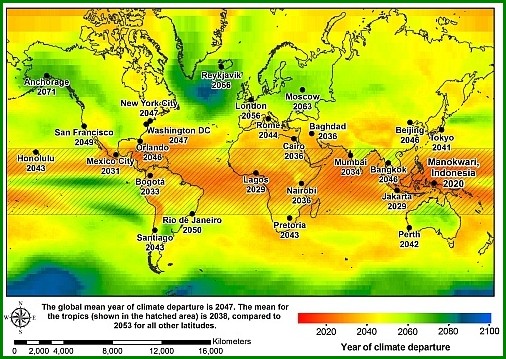After 35 years, the average global temperature will exceed the limits of historical After 35 years, the average global temperature will exceed the historical limits.
Indonesian town of Manokwari is destined to become the unwitting icon of climate change. Around 2020 the capital of West Papua, located on the shore of the Pacific Ocean, will be one of the first places on the planet, which established a completely new environment. The concern is that the coldest years will be warmer than the hottest in the last 150 years.
This is the conclusion reached by researchers who have tried to create a regional index of climate change. They wanted to determine the point at which the local temperature fluctuations remain within the historical variability. According to the results, such deviations will begin in the tropics - and then get to the higher latitudes.
If the emissions of carbon dioxide will remain unchanged, the climate of the Earth moves away from historical averages in 2047.
Very soon, the limiting cases are the norm, - says a leading avtorKamilo Mora of University of Hawaii at Manoa (USA).
Tropical coral reefs will be among the first ecosystems that will face the hottest climate for 150 years. (Photo by Keoki Stender / MarineLifePhotography.com.)
Since the temperature in the tropics vary little between seasons, even a small increase in average temperatures could lead to unprecedented weather conditions - with negative consequences for the ecosystems that are home to much of the world's biodiversity. The economic opportunities of many tropical countries also are limited, so to adapt to the new threats will be difficult.
Rules of the climate game - those that govern everything from the interaction of species to the frequency of severe storms - are changing, - emphasizes paleoclimatologist Jack Williams of the University of Wisconsin-Madison (USA), who was not involved in the study.
In most cases, the authors are interested primarily predictions of absolute temperature changes - for example, when the Earth will heat up by an average of 2 ° C compared to pre-industrial levels. On the regional climatic shifts are largely unknown.
Group Mr. Moore in his predictions was based on data models 39 and 7 environmental parameters (temperature in the lower atmosphere, precipitation, etc.) measured in the years 1860-2005. The researchers conducted a simulation of the next century in search of a threshold beyond which climate indicators of a region will be released for the historical framework.
It was found that the active reduction of greenhouse gas emissions in order to stabilize the level of carbon dioxide in the atmosphere would delay the general climate deviation of the Earth 22 years - to 2069-th. Twenty years is not much, but they can give us the ability to adapt to new climatic conditions, - said Mr. Moore.
Approximate time of arrival of a new climate, according to the model of RCP 8.5 (authors of the image).
Recent data suggest that some tropical species that are accustomed to only small variations in climate are particularly susceptible to rapid change - in contrast to the species, to learn to survive in a variety of settings.
But it remains unclear what types will have the hardest, like Sean McMahon of the Smithsonian Environmental Research Center (USA). This article very clearly explains that we must not talk about if the climate will have an impact on the ecosystem, and that when he does, - the expert. - Scientists have time to start predicting the specific impact for local biodiversity.
Mr. Williams holds the same view: The work clarifies the chronology of the emergence of new climatic conditions, but to determine the chances of survival of species, will have to look even further into the past, in order to determine their reaction to the glacial periods, periods of rapid warming and other fundamental climatic shifts.
in the footsteps of Nature, Nature News, compulenta.computerra.ru
AGU Chapman Conference -- Climate Science
AGU Chapman Conference - Communicating Climate Science: A Historic Look to the Future
Snow Mountain Ranch, Granby, Colorado, USA - 8-13 June 2013
Highlight Video
The goal of this Chapman Conference is to bring together scholars, social scientists, and journalists to discuss both the history and recent advances in the understanding of climate science and how to communicate that science to policymakers, the media, and society. A research agenda of the conference will focus on the efficacy of scientific communication, with ideas on improved practices arising as an outcome from collaborations spawned at the conference.
This exploration will take place through: 1) discussions covering the history of climate science and successes and failures in communicating scientific ideas to the policy makers and public; 2) an assessment of where we are with respect to current knowledge of climate science and its communication and acceptance by society; 3) a comparison with experiences in other areas producing similar difficulties between scientific knowledge dissemination, societal acceptance of that knowledge, and governance.
For more information, please visit:
http://chapman.agu.org/climatescience/
Video and images produced by AGU
Graphics from "yocreative": http://videohive.net/
Music: "Inspire Greatness" by thesecession: http://audiojungle.net/